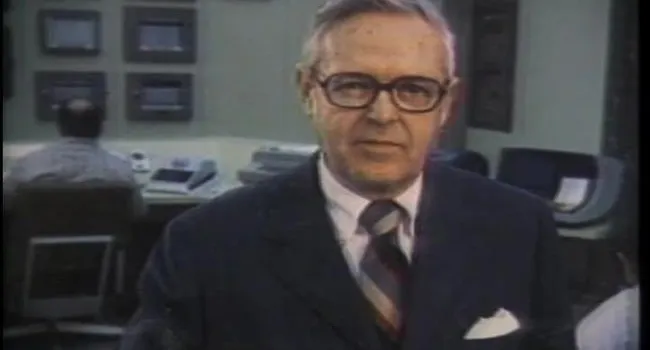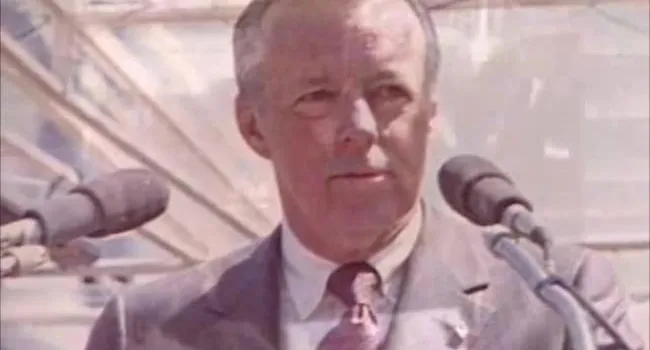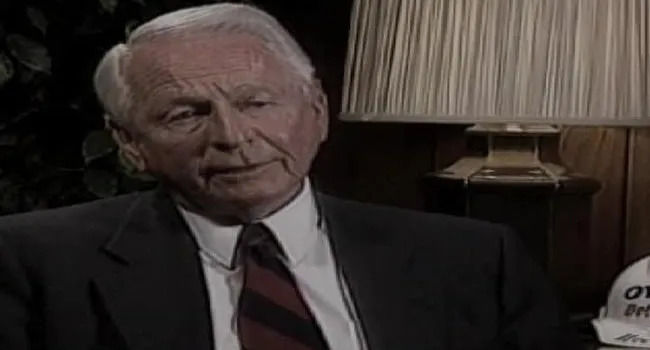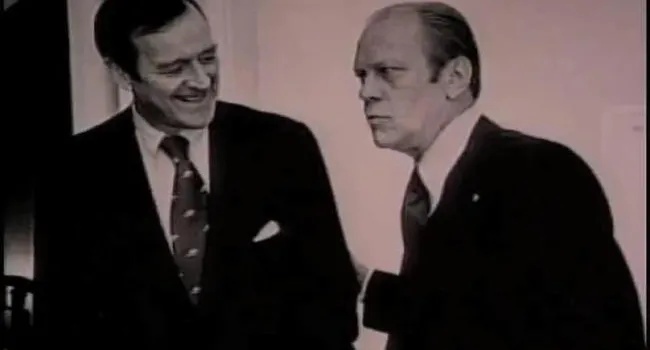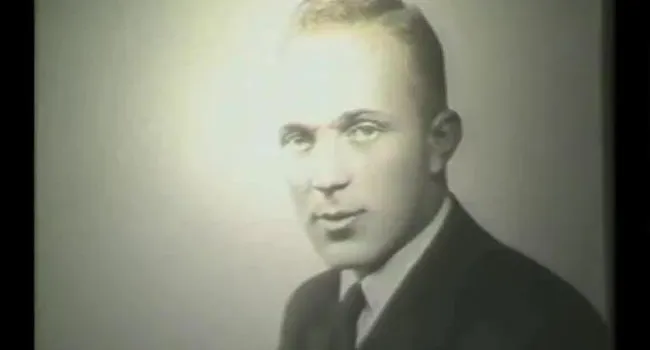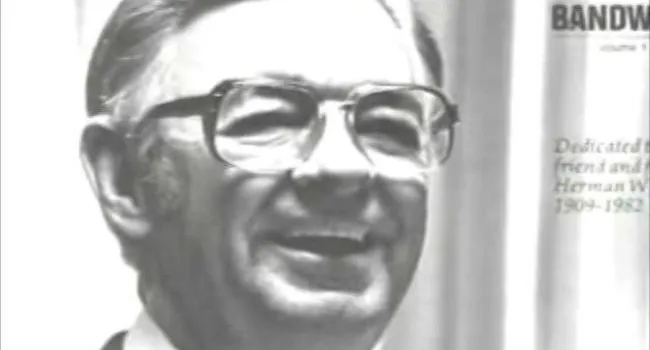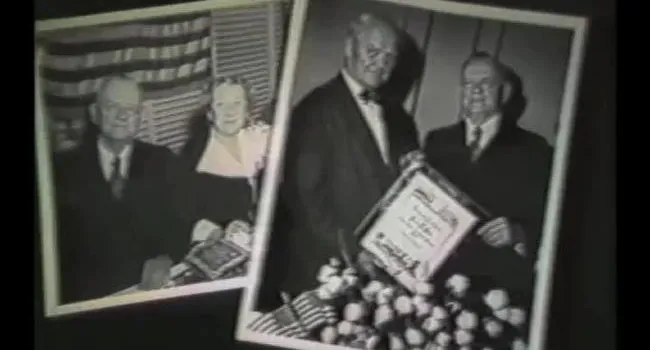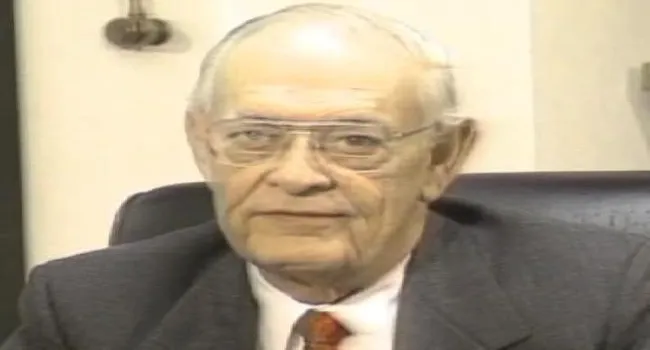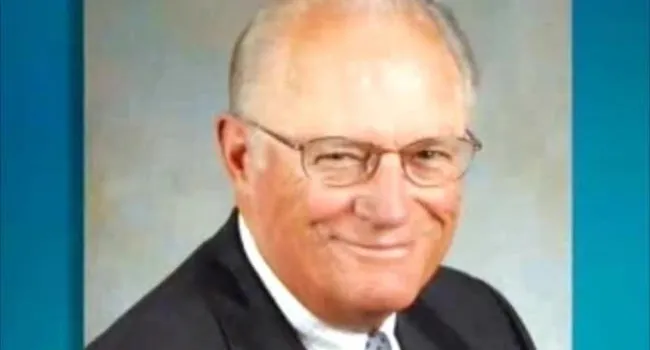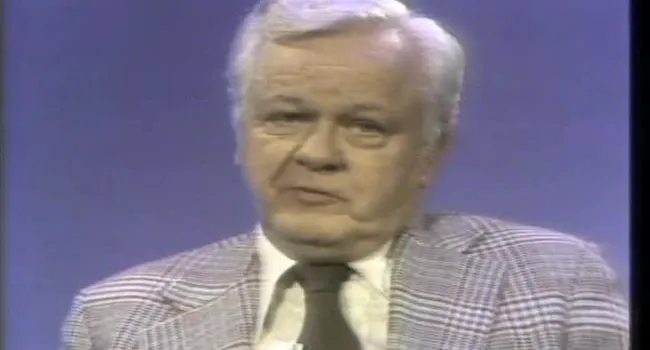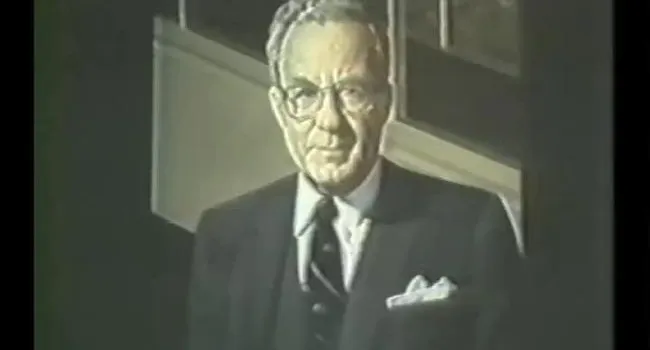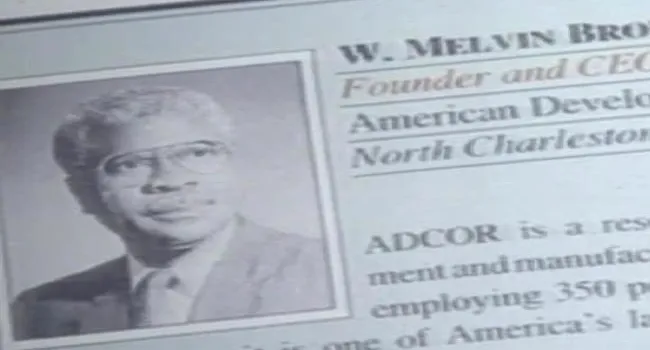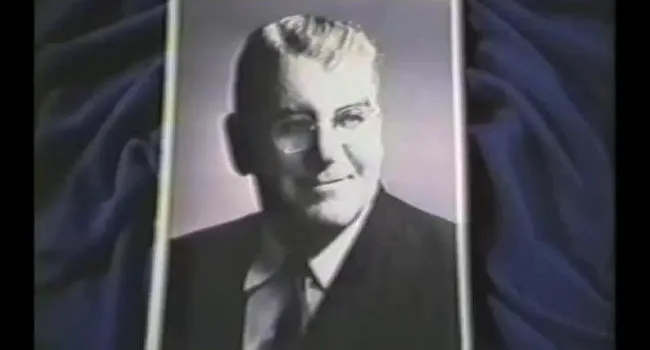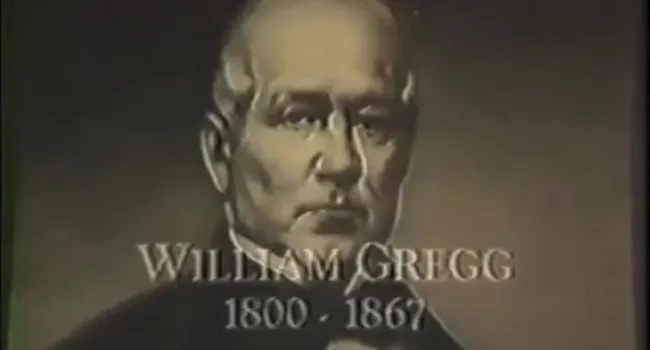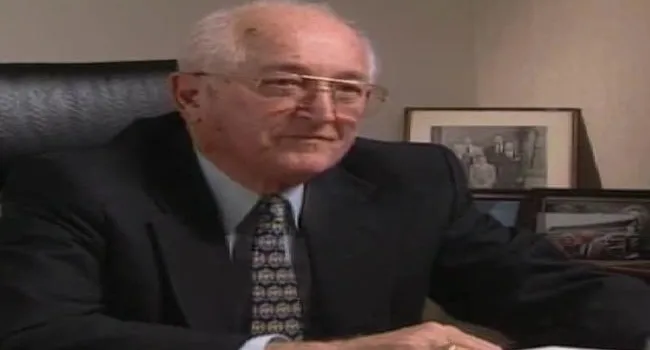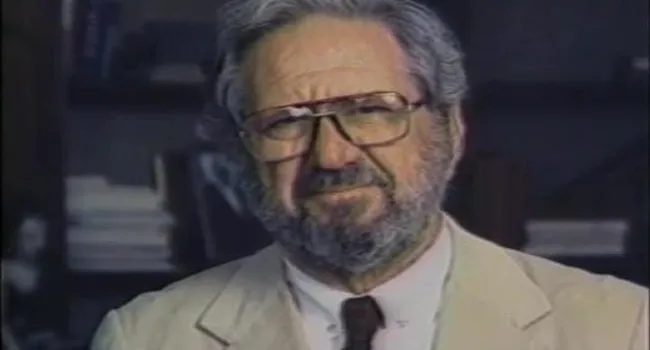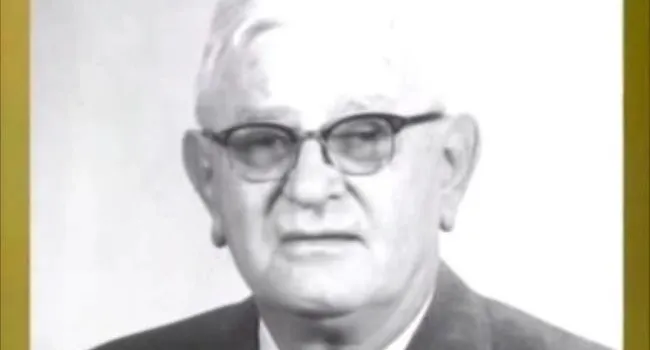George William "Bill" Rogers
(Born February 8, 1925)
Bonitz, Inc., and Consolidated Systems, Inc., are hardly household names in Columbia, where they were established in the 1950s, but both are well known to architects and contractors nationwide, and globally in the case of CSi. The man behind these remarkably successful enterprises is Bill Rogers, an unpretentious business leader who has avoided the limelight while creating thousands of jobs and making major personal contributions to his community and state.
Bonitz is a subcontractor that has been involved in the construction of hundreds of major buildings and schools in South Carolina and the Southeast. Bonitz has installed roof decks, acoustical ceilings, dry wall, carpeting, flooring, and partitions for most of the major buildings completed in Columbia during the past 45 years. CSi, founded as RBM Metals Co. in the late 1950s, is an industry leader in the manufacture of steel construction products used in commercial, industrial, residential, and institutional buildings, and bridges. It serves a global market from its Columbia headquarters and from plants in Memphis, Tenn., and Terrell, Texas.
Bonitz and CSi were developed during a long partnership between Rogers and the late Thomas C. Meredith. Today, Bonitz is an employee-owned company with a workforce of 800 in seven Southeastern states and Colorado, with annual revenue of about $130 million. The Rogers family now owns CSi, which employs 500 in South Carolina, Tennessee, Mississippi, and Texas. Annual revenue is about $230 million.
George William "Bill" Rogers was born February 8, 1925, in Ocilla, Georgia, the youngest of three sons of Henry Levy and Ruth Murphey Rogers. His father practiced law and operated an insurance company in Ocilla. His eldest brother, Murphey Rogers, is an attorney in Ocilla, and brother Henry Levy Rogers, Jr., a Methodist minister, is deceased.
In 1936, when Rogers was 11, he lost his father. His mother reared her three sons and managed the family insurance business.
Rogers and his brothers were close, and fished and hunted and played basketball and golf together. He began playing golf as a seventh or eighth grader and recalls walking barefoot, canvas golf bag on his shoulder, the three miles to the community's nine-hole golf course, which in those days had sand greens.
Rogers attended the public schools of Ocilla and graduated from Ocilla High School in 1942 as valedictorian of his class--a class of 42, he admits, in his self-deprecating manner. He also played basketball, and during his senior year, tiny Ocilla won its division championship.
Rogers enrolled at Georgia Tech, with aeronautical engineering as his major and Naval ROTC as a motivation to excel on an academic fast track. Despite the demands of an engineering curriculum, he lettered in basketball.
He graduated in 1944, two and a half years after he enrolled at Georgia Tech, received his commission, was assigned to the heavy cruiser USS Pensacola, and was off to sea and World War II. His assignment: a 20-year-old division officer responsible for 50 gunners. The Pensacola was in the Aleutians when the atomic bomb was dropped.
Rogers was discharged in 1946 with the rank of lieutenant (jg), and went to work as a salesman for Acousti Engineering Corp. in Charlotte. The main product was an innovative ceiling tile system made of wood cane fiber and patented by Celotex. The product propelled Acousti to the forefront of the ceiling materials market.
There, he met Tom Meredith, a Georgia Tech architecture graduate, and the two roomed together in Charlotte. In 1951, Rogers was called back into the Navy for Korean War duty, and Meredith went to work in construction for DuPont at the Savannah River Site.
Back in the Navy, Rogers served aboard the destroyer USS Stephen Potter, which patrolled Wonsan Harbor in one of the longest blockades of a port in Naval history. He served as operations officer, second in command to the ship's captain. He received the Navy's Commendation Medal for his service.
Rogers left the Navy in 1953 and returned to Georgia Tech and earned a master's degree. Back at Acousti, he was offered a job in another state, which wasn't acceptable. Tom Meredith finished his work for DuPont and was offered a job in manufacturing, which he turned down. So both were jobless.
While at Acousti, Rogers had met John Bonitz of Greensboro, N.C., an Acousti competitor whom he held in high esteem. He and Meredith contacted Bonitz and told him they wanted to start a company with him. Within three weeks-in February 1954-Bonitz of South Carolina was in business.
With Meredith's construction expertise and Rogers' marketing skills, they were in the black the first year. Meredith supervised the offices and construction, and later served as chairman; Rogers, who became president, traveled throughout South Carolina, calling on architects and contractors to market Bonitz's services.
Their earliest subcontracting work was installing ceilings and pouring roof decks. Meredith's innovations significantly speeded up traditional methods. In the late 1950s, they formed RBM Metal Co., which evolved into today's CSi. RBM's first product was ceiling grids to support ceiling tiles.
They moved into the partition business, which developed into the drywall business. Next, they began installing pre-cast roof decks. Bonitz Insulation of Georgia and Bonitz Insulation of Alabama followed. In 1963, Rogers and Meredith bought John Bonitz's interest in the operation.
Meanwhile, Rogers and Connally Smith were married June 14, 1956, in Chattanooga, Tenn. The daughter of Howard Morgan, Jr., and Louise Morgan Smith of Lookout Mountain, Tenn., she was a 1950 graduate of Queens College in Charlotte, where she and Rogers met.
Their romance survived his service during the Korean War, her teaching jobs in Charlotte and Japan, his graduate study at Georgia Tech, and his involvement in starting Bonitz and RBM.
They would become the parents of a daughter, Louise Rogers Slater of Columbia and a son, George William Rogers, Jr., of Washington, D.C., and the grandparents of two, William Clayton Slater and Steven Lucas Slater.
Connally Smith died December 3, 2001, after a long illness.
Bonitz continued to grow, later settling on the name Bonitz, Inc., and spreading throughout the Southeast and even into Colorado. As its services and products expanded, so did its reputation for quality, efficiency, and cost containment. Its financial position and bonding capacity were always stable, attracting larger and larger jobs. Today, Bonitz, Inc., and its subsidiaries are the largest subcontractors in the Southeast and possibly the nation.
CSi's composite, form, roof, and bridge decking products are marketed worldwide for commercial, industrial, institutional, and public works applications. The Steel Deck Division operates facilities in Columbia, Memphis, Tenn., and Terrell, Texas. CSi leads the steel decking industry with over one million square feet of manufacturing capacity. CSi's Light Gauge Framing Division manufactures drywall, curtain wall, furring systems, panels, structural studs, joists, tracks, and trusses. And it also offers cargo transportation through its wholly owned subsidiary, Consolidated Cargo Carriers, Inc.
Tom Meredith died in 1989, and the Rogers family purchased his interest in Bonitz. In 1999, Rogers transferred 95 percent of his family's interest in Bonitz to an Employee Stock Ownership Plan, giving employees an opportunity to purchase the company. The purchase is about 50 percent complete. Rogers continues as Bonitz chairman.
Today, Rogers is chairman-emeritus of CSi, and his daughter, Louise Slater, serves as chairman. Steve Holtschlag has been president and CEO of CSi since 1992. Rogers' son, Billy, is a member of the board of directors.
Holtschlag says of Rogers, "The aspects of Bill's life that distinguish him is his ability to balance what I would describe as three C's. First his church: It is clear that his support of his church has been a cornerstone of his life. Second is his devotion to the community in which he lives. His involvement in the Carolina Children's Home is but one of a myriad of activities in which he is engaged, and finally his involvement and support in the companies that he has led. All of these activities are coupled with an intense competitive drive that has led to his success."
Rogers considers himself semi-retired and spends much of his leisure time playing golf, although he enjoys hunting and fishing as well.
He was the force behind the Palmer Festival, an annual outing for a dozen Columbia golfers at St. Simon's Island, Ga., that began in the late 1960s. The event was started when Arnold Palmer was at his peak as a professional golfer, and thus the name, "Palmer Festival." The group has made the trip to the island every year since and stays at a home on property Rogers' mother bought before World War II. The stag event revolves around golf and gin rummy.
Rogers has been an avid golfer since boyhood, and friends insist he gets better with age. His golfing goal for the year he turned 75 was to shoot his age. Bill Rogers fired a 70 that year, plus a hole-in-one, which won him a brand-new Ford Mustang. He donated it to a charity.
Rogers insists that he's not a philanthropist, nor that he has been especially active in non-profit organizations. But his modesty belies reality. He is a past chairman and present board member of the Carolina Children's Home, which he has generously supported; member and past Advisory Board chairman of the Salvation Army; and a member of the boards of the Alston Wilkes Society Foundation and Bethlehem Community Center.
He is a director of the Central Carolina Community Foundation, and, in 1999, he received the Outstanding Philanthropist Award sponsored by the Central Carolina Chapter of the National Society of Fund Raising Executives.
In 1998, Rogers was inducted into the Capital Senior Center's Midlands Senior Hall of Fame.
Rogers is a former member of the boards of Claflin College, the University of South Carolina School of Medicine Business Partnership, and the Sisters of Charity Providence Hospital Foundation. He served two terms as chairman of the Industrial Development Commission, predecessor of the Central Carolina Economic Development Alliance, and affiliate of the Greater Columbia Chamber of Commerce.
His other interests include the Indian Waters Council of the Boy Scouts of America, the Women's Shelter, and the United Way of the Midlands. He donated property in Arthurtown near Columbia, and through his business ownership, participated in building five houses on the property for Habitat for Humanity.
He attends Trenholm Road United Methodist Church and has served as a member of the Board of Trustees, chairman of the Board of Stewards, member of the Building Committee, and is presently chairman of the Long Range Planning Committee.
Rogers was inducted into the South Carolina Business Hall of Fame in 2002.
© 2002 South Carolina Business Hall of Fame

